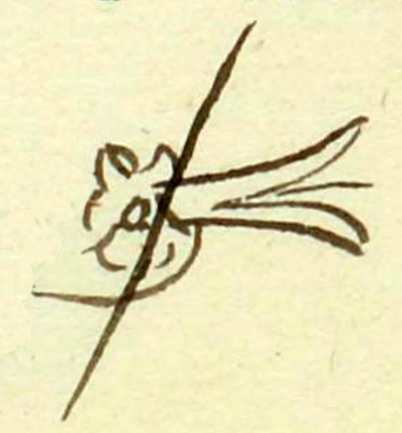Ce Ecatl (MH607v)
This black-line drawing of the simplex glyph-plus-notation for the personal name Ce Ecatl (or better, Ce Ehecatl, “One Wind,” attested here as a man’s name) shows a single, straight line for the number one (ce) cutting through the head and face of the day sign for wind (ehecatl), shown in profile, facing toward the viewer's right. This version of Ehecatl (the divine force of wind) has the look of a bird's head with a large open beak. Possibly a very thin tongue protrudes from inside the open beak. Ehecatl was believed to have a device in his mouth for blowing wind around the Earth.
Stephanie Wood
Very often, as the gloss shows here, the divine force of the wind, which is a name of a day in the tonalpohualli, the 260-day divinatory calendar, is written without the reduplication of the "e." The result is ecatl, which some define as air or breath, instead of ehecatl, wind. In naming glyphs in the collection, we are trying to be true to the spelling of ecatl, even when we are certain, as here, that ehecatl is likely meant. The big blowing device at the mouth is a tip off to ehecatl (see the Pitztli glyph for further evidence that this is a blowing device). Gabrielle Vail and Christine Hernández (Re-Creating Primordial Time, 2013, ) describe Ehecatl as the wind aspect of Quetzalcoatl, and they note that Ehecatl "wears a buccal (duck) mask through which to blow wind."
Calendrics were an important element in the Nahuas' religious views of the cosmos, and the divine force of the wind (whether ecatl or ehecatl) has a significant role in daily life and the writing system. Most agriculture is temporal for the Nahuas, dependent upon rainfall, and the wind often precedes the rain.
Stephanie Wood
gaspar ceyecatl
Gaspar Ce Ecatl (or Ce Ehecatl)
Stephanie Wood
1560
Jeff Haskett-Wood
números, calendarios, días, viento, aire, aliento, divinidades, fuerzas divinas, deidades, religión indígena, ave, aves, pájaro, pájaros, pluma, plumas

ce, one, https://nahuatl.wired-humanities.org/content/ce
eca(tl), air, breath, https://nahuatl.wired-humanities.org/content/ecatl
eheca(tl), wind, https://nahuatl.wired-humanities.org/content/ehecatl
Uno Viento, 1-Viento
Stephanie Wood
Matrícula de Huexotzinco, folio 607v, World Digital Library, https://www.loc.gov/resource/gdcwdl.wdl_15282/?sp=297st=image.
This manuscript is hosted by the Library of Congress and the World Digital Library; used here with the Creative Commons, “Attribution-NonCommercial-ShareAlike 3.0 License” (CC-BY-NC-SAq 3.0).








